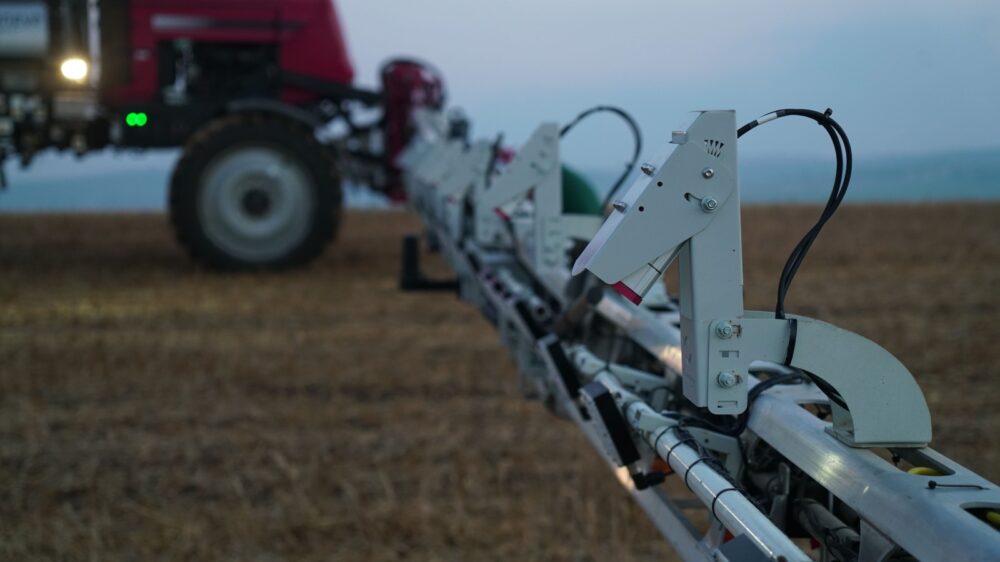[ad_1]
Chemical engineer Dganit Vered learned a little something that shifted her overall vocation concentrate when she led a multinational R&D staff of 250 workers for Israeli seed breeder Hazera from 2015 to 2017.
“When I traveled close to the earth and fulfilled my staff users, I noticed the difficulties had been considerably bigger than could be solved via the seeds,” she tells ISRAEL21c.
Obtaining worked for 17 yrs at Intel Israel and then in pharma and seed firm R&D, Vered believed she could enable.

Dganit Vered, CEO of Intelligent Agro Fund. Photograph by Ariel Besor
Very last May possibly, she grew to become CEO of Smart Agro Fund, a public R&D partnership launched in 2020 to progress startups addressing huge problems in agriculture. (This need to be her destiny: dganit is a flower increasing around grain fields, and vered is a rose.)
With the globe population expected to access 10 billion by 2050, growers ought to deliver extra foodstuff under more and more difficult ailments: extraordinary weather conditions and extreme shortages of labor, drinking water, pollinating bees and arable land.
“At the close of the working day, we will need to maximize yields by about 50 p.c, with 50 % less sources, in order to feed the earth,” Vered suggests. “That’s where by we are heading with local weather alter.”
Clever Agro Fund now has six portfolio firms and Vered has grow to be familiar with the wide landscape of somewhere around 350 Israeli ag-tech startups top the earth in areas from precision irrigation to wastewater reuse to seed breeding.
Listed here are some of the methods they have for today’s most urgent difficulties in food stuff creation.
Regenerative agriculture
Soil erosion is a big element in the reduction of arable land. Soil that is worn out from intense growing and chemical spraying provides much less crops and a lot more carbon emissions.
Surprisingly, agriculture accounts for about 27% of CO2 emissions around the world.
“We see soil becoming substantially fewer fertile and getting rid of its robust means to keep carbon for the reason that of agricultural practices these kinds of as tilling — when the soil is turned and the carbon-capturing germs underneath get exposed to air and sunlight,” points out Vered.
This situation has provided increase to the regenerative agriculture movement.
“It’s about retaining the soil wholesome, strengthening the soil’s material and dealing with it with regard,” states Vered.
Quite a few multinational conglomerates pay to carry out regenerative agriculture tactics on the farms that provide them. These include off year “cover crops” to replenish the soil and precision irrigation alternatively than flood or trough irrigation.
For instance, PepsiCo is introducing Israeli N-Drip gravity drip irrigation to its growers in 60 nations around the world, aiming to reduce CO2 emissions by as considerably as 83% and methane emissions up to 78%.
Other regenerative agriculture tactics are livestock grazing, organic pesticides and crop rotation.
“Specific crops have unique impacts on the soil and if you preserve developing the exact matter the soil will get depleted,” claims Vered. “Rotating crops like onions and potatoes is pretty popular, but it is not accomplished plenty of.”
Several Israeli firms help regenerative agriculture by assisting farmers reduce their use of substances.
GreenEye Systems, for case in point, lowers herbicide use with an AI-run good spraying process that treats only the food items crops and not the weeds.

Picture courtesy of Greeneye Systems
Metabolic Insights uses reducing-edge know-how to isolate and commercialize plant-based compounds for crop protection and productiveness.
GroundWork BioAg made a low-cost method to produce mycorrhiza, a fungus that is effective in symbiosis with plant roots to lower fertilizer needs and enable plants cope with stressors these as drought.
“This is vital mainly because we are heading into a fairly major scenario of h2o shortage around the globe,” claims Vered.
Robotic farmhands
The labor shortage (and affiliated human resources expenses) is pushing the evolution of mechanized options for unskilled farm tasks, states Vered.
Blue White Robotics offers a kit that can make any tractor completely autonomous, additionally program enabling a single human operator to control a fleet of autonomous farm autos these kinds of as tractors, robots and drones.
Automato Robotics is developing an automated workforce for greenhouses. Controlled from a single system, these robots can harvest, spray, pollinate and inspect indoor crops these as tomatoes.
https://www.youtube.com/look at?v=ZT-VGsuuuio
Tevel Aerobotics Technologies is piloting (no pun intended) its Flying Autonomous Robots that choose fruit in orchards of any sizing. Synthetic intelligence directs them to the fruits ripe for finding.
Darwin, an Italian-Spanish fruit harvesting system creator, has partnered with Tevel in producing the world’s to start with totally commercial built-in autonomous fruit-harvesting program.
Greenhouse Robotic Employee (Grow) technology from MetoMotion harvests greenhouse tomatoes and analyzes information for yield estimation and tension detection.
Biotechnology also has a job to engage in in regenerative agriculture, says Vered. “Biotechnology is potent in Israel, and it is producing plants extra sturdy or less complicated to harvest or rising yields.”
BetterSeeds, for instance, alters the architecture of quite a few kinds of crops to help equipment selecting and maximize generate.
Buzzy remedies
“Another large problem in entire world agriculture is the decrease of bees. We are pretty competently killing bees and they’re on the edge of extinction,” suggests Vered.
“Israel is incredibly sturdy in systems dealing with this challenge, and the methods out there are very vast.”
Polly, a robotic system from Arugga AI Farming, performs artificial pollination in tomato greenhouses. Riding on tracks involving rows of plants, Arugga’s robots use AI to determine each flower’s readiness to be pollinated. This neatly solves two problems: lack of bees and labor.
https://www.youtube.com/view?v=s1UeIlhGUuA
Edete Precision Technologies for Agriculture offers “Artificial Pollination as a Service” that’s been demonstrated to raise the generate of almond orchards. The program mirrors the motion of bees by collecting, storing and distributing pollen to the bouquets.
Wise Hives from BeeHero increase checking, facts collection and automatic actionable insights to boost the performance of purely natural pollination.
Robotic, photo voltaic-driven BeeHomes from BeeWise each and every household 24 colonies, allowing for beekeepers to address hives and care for their bees remotely with the assist of pc eyesight and AI. BeeWise just raised $80 million in a Collection C round in which 1 of the contributors was Sanad Abu Dhabi.
To examine about far more Israeli answers for the bee shortage, simply click in this article.
In a foreseeable future report, we’ll see how Israel is tackling a different massive agriculture trouble: the 30% of develop that never ever tends to make it from industry to industry.
[ad_2]
Source link





More Stories
Common Mistakes To Avoid While Choosing Bolt Manufacturers
Computer and Technology Today
The Reasons Agriculture is Important